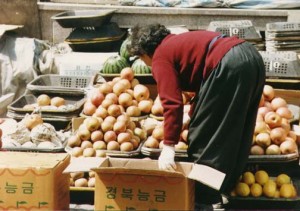Local provincial governments are working hard to develop farmland in other countries because it’s more cost-effective than relying on imports.
Land overseas in the Maritime Province of Russia in East Siberia, Cambodia and the Philippines is large and cheap, officials explain.
The latest land deal announced last Monday involves state funding starting next year for Korean companies to buy massive tracts of land in South America.
The government said it is considering investing 29.9 billion won ($25.8 million) in Paraguay and Uruguay.
In previous agro-deals involving land for agricultural development, primarily in Southeast Asia, the land has been rented.
The South Gyeongsang Government Office is promoting development of overseas farm fields under a plan to secure food reserves for the future and protect farmers in Korea against the price surge of imported agricultural products.
An 11-member team from the office visited the Maritime Province of Russia for four days to survey land for possible acquisition.
“It will be reasonable to build farmland for South Gyeongsang in the Maritime Province since there is unused land there and the local farmers lack farming skills, resources and a labor force,” said Jeong Jae-min, 46, head of the Agricultural Support Division at the office, who led the survey squad. “There are 250 hectares [617 acres] of land that is capable of farming but only 50 hectares is being cultivated. The government of the Maritime Province said it wants to develop better seeds by adopting advanced farming techniques.”
During the visit, the team signed a memorandum of understanding with the Maritime Province government in agricultural exchanges and cooperation.
Jeong said South Gyeongsang is planning to raise beans and corn by expanding the size of farmland to an additional 50 hectares next year and 3,000 hectares by the end of 2011. He also said South Gyeongsang is considering hiring Koryoin people, or ethnic Korean migrants living in the Maritime Province, to work on the land.
Meanwhile Gyeonggi is planning to cultivate 16,000 hectares of farmland in Sulawesi, southeastern Indonesia, for four years if a deal with the Sulawesi government goes through next year.
The province expects that the 16,000 hectares of land will produce 320,000 tons of corn annually.
In addition, South Jeolla has rented about 94,000 hectares in Mindoro in the Philippines to produce corn. The province established a corporation called Jeonnam Feedstock Ltd. in January this year to manage corn production.
The province is also considering advancing into Sulawesi.
At least one deal is being handled privately rather than through government.
Sixteen livestock farmers in South Chungcheong invested 100 million won each and purchased 474 hectares of land in Kampot, Cambodia, in February this year.
They bought the land for around 200 won per 3.3 square meters (35.5 square feet). The farmers said they are going to reclaim hilly land early next year and produce 3,000 tons of corn for the Korean market.
Farmers said it’s nearly 20 percent cheaper to grow corn in Cambodia than to buy on the international market.
In another deal, the North Gyeongsang provincial government signed a memorandum of understanding for exchanges in agriculture affairs with the Ministry of Food, Agriculture and Light Industry in Mongolia in July and has since then opened an agricultural development assisting center in Ulan Bator, the capital of Mongolia.
The center supports Gaeunpam, an agricultural corporation based in Cheongdo County, North Gyeongsang, aimed at developing 20,000 hectares of farmland for Korean farmers to use in the Bulgan province of Mongolia for the next 40 years.
“A number of Korean farmers are seeking new opportunities overseas to take advantage of large and cheap lands since they think it is difficult to raise their profits in Korea due to lack of farmlands and fierce competition,” said Lee Ha-yun, an official at North Gyeongsang government office.
However, not everyone is happy with Korea’s land purchases overseas.
The Manila Bulletin reported in August that a Filipino lawmaker and farmer, Rafael Mariano, had called for a probe into a deal between the local governments of Mindoro provinces with Jeonnam Feedstock Ltd., a deal the lawmaker says represents a “new wave of global grabbing” and is “a threat to land rights of farmers and indigenous peoples.”
Similarly, the chairman of a senate committee in the Philippines on labor issues, Senator Jinggoy Ejercito Estrada, has referred to richer nations buying up land in poorer nations for their own food security as “agri-colonialism,” according to the Philippines’ Daily Tribune in July.
“Instead of helping develop these lands for our own farmers’ benefit, is the government now in essence selling these prime, productive properties to foreigners?” Estrada was quoted as saying.
A land lease in Madagascar involving Daewoo Logistics was called off early this year by the country’s self-proclaimed president, Andry Rajoelina, following the ousting of Marc Ravalomanana.
By Song Yee-ho, Hwang Sun-yoon [[email protected]]













